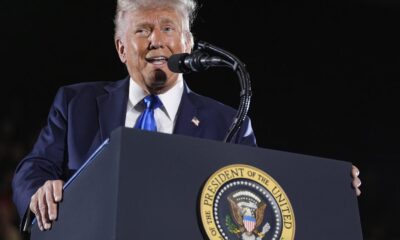South Korea’s president defended his martial law decree as an act of governance and denied rebellion charges Thursday (December 12, 2024), rejecting the opposition-led impeachment attempts against him and investigations into last week’s move.
Yoon Suk Yeol’s televised statement came hours before the main liberal opposition Democratic Party submits a new impeachment motion against Mr. Yoon. The opposition party plans to put the motion on a floor vote this Saturday (December 14, 2024).
Its earlier attempt to impeach Mr. Yoon fell through last Saturday, with ruling party lawmakers boycotting a vote at the National Assembly.
ALSO READ: How will martial law flip-flop affect S. Korea?
Mr. Yoon’s December 3 martial law declaration, the first of its kind in more than 40 years in South Korea, has generated political chaos and large protests calling for his ouster. The decree brought hundreds of armed troops attempting to encircle parliament and raiding the election commission, though no major violence or injuries occurred, and he was forced to lift it about six hours later.
“I will fight to the end, to prevent the forces and criminal groups that have been responsible for paralyzing the country’s government and disrupting the nation’s constitutional order from threatening the future of the Republic of Korea,” Mr. Yoon said.
Warning to opposition party
Mr. Yoon, a conservative, said his martial law introduction was meant to issue a warning to the main liberal opposition Democratic Party, which he said has been paralysing state affairs and destroying the country’s constitutional order. He said the deployment of less than 300 soldiers to the National Assembly was designed to maintain order, not dissolving or paralysing it.
Mr. Yoon called the Democratic Party “a monster” and “anti-state forces,” which he said repeatedly tried to use its legislative muscle to impeach top officials, undermine government budget bills and sympathize with North Korea.
“The opposition is now doing a knife dance of chaos, claiming that the declaration of martial law constitutes to an act of rebellion. But was it really?” Mr. Yoon said.
Act of governance
Mr. Yoon said his martial law decree was an act of governance that cannot be the subject of investigations and doesn’t amount to rebellion.
It’s unclear how Mr. Yoon’s statement would affect his fate. Earlier Thursday, the leader of his own conservative party, Han Dong-hun, said Mr. Yoon was making it clear he had no willingness to step down voluntarily and called for party members to vote in favour of his impeachment at the upcoming National Assembly vote.

Opposition parties and many experts say the martial law decree was unconstitutional. They say a president is by law allowed to declare martial law only during wartime or similar emergency situations, but South Korea wasn’t in such a predicament. They argue that deploying troops to seal the National Assembly to suspend its political activities amounted to rebellion because the constitution doesn’t allow a president to use the military to suspend parliament in any situation.
Mr. Yoon’s statement was seen as an about-face from his previous position. Last Saturday, Mr. Yoon apologised over the martial law decree, saying that he won’t avoid legal or political responsibility for it. He said he would leave it to his party to chart a course through the country’s political turmoil, “including matters related to my term in office.”
Police search
On Wednesday, Mr. Yoon’s office resisted a police attempt to search the compound.
The main focus of the investigation is finding whether Mr. Yoon and other top military and government officials involved in imposing martial law committed rebellion. A conviction for rebellion carries a maximum penalty of death.
Earlier this week, Mr. Yoon’s former defence minister was arrested on allegations of playing a key role in a rebellion and committing abuse of power. He became the first person formally arrested over the martial law decree.
Kim Yong Hyun, one of Mr. Yoon’s close associates, has been accused of recommending martial law to Mr. Yoon and sending troops to the National Assembly to block lawmakers from voting on it. Enough lawmakers eventually managed to enter a parliament chamber and they unanimously rejected Mr. Yoon’s decree, forcing the Cabinet to lift it before daybreak on December 4.
Published – December 12, 2024 09:31 am IST







































